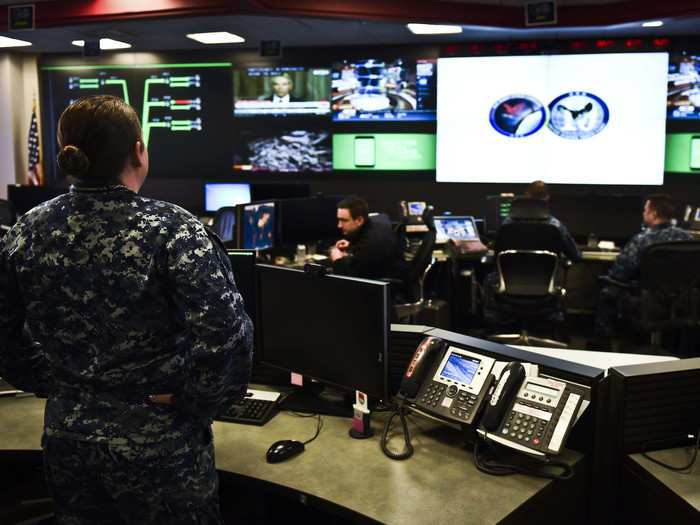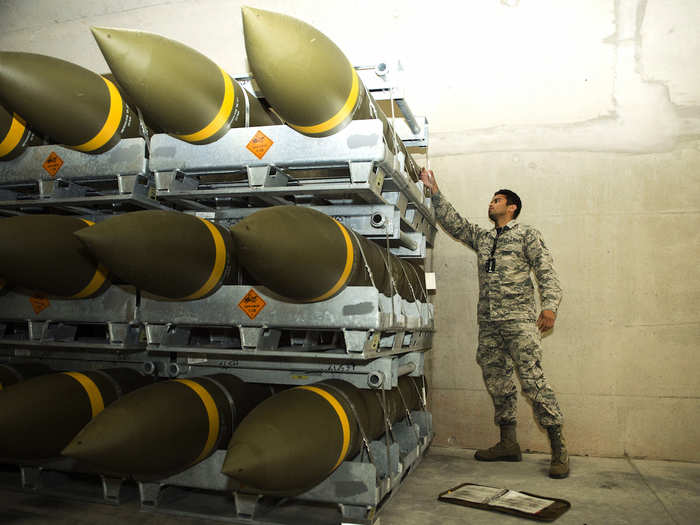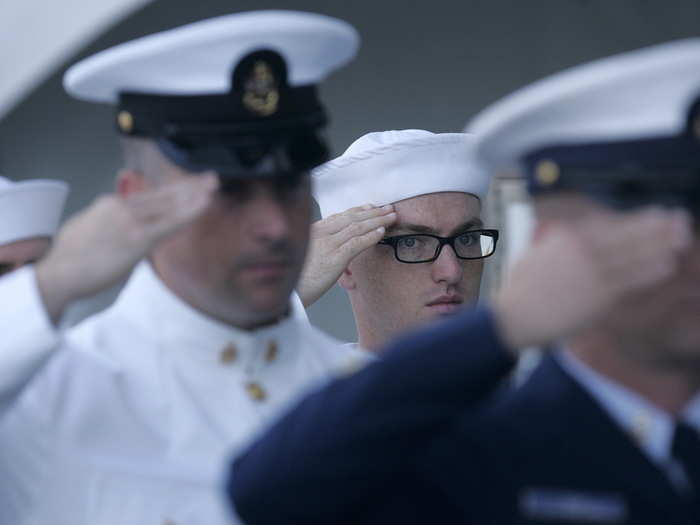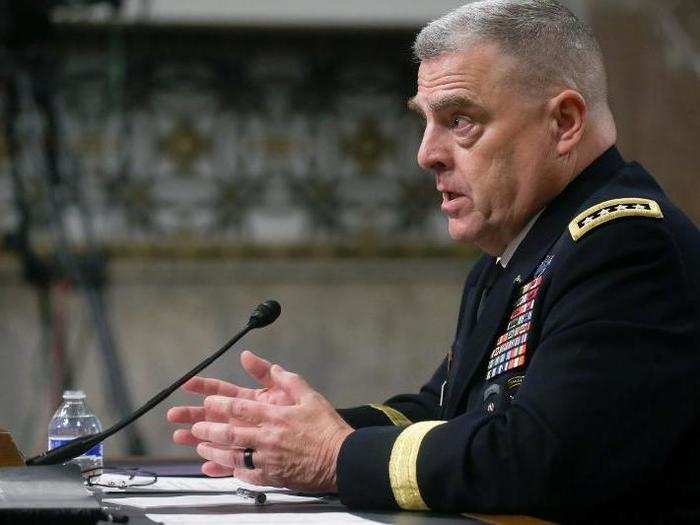- Home
- slideshows
- miscellaneous
- Trump's next top military adviser wants Americans to forget 4 'myths' about war, but he needs to explain a few things first
Trump's next top military adviser wants Americans to forget 4 'myths' about war, but he needs to explain a few things first
<em>Milley's "myth" #1: "The 'Short War' Myth"</em>

Milley's "myth" #2: "The 'Win From Afar Myth'"
 ' layout='fill' objectFit='cover' loading='lazy' width="700" height="400"/>
' layout='fill' objectFit='cover' loading='lazy' width="700" height="400"/>
This supposed "myth" is truly mystifying: Milley apparently doubts it's possible that "wars can be won from afar, without getting troops on the ground." How can that be true in an age of cyberwarfare?
Aren't we being constantly told that devastation can be wrought via cyber means from hostile countries without a single enemy soldier stepping foot on US shores? Or is the cyber threat itself a "myth"?
If so, why did DoD tell us last year that "the cyber threat was at the top of the list of worldwide threats the director of national intelligence chose to highlight [to the] Senate Select Committee on Intelligence hearing"? (Emphasis added.)
Furthermore, for all his unquestioned expertise in land warfare, does Milley really understand not only what cyber can do, but also what modern air and space power can accomplish?
He points to "strategic bombing during World War II or launching cruise missiles" as examples of what won't be "enough to defeat an enemy." Actually, it was the strategic bombing of Japan with an atomic bomb that caused it to sue for peace, but the real question is this: Does Milley fully appreciate the capabilities of air (and missile) technology not as of 1945, but in 2019?
Here's a baffling one: How would Milley implement his conviction about the indispensability of "getting troops on the ground" into a strategy if we find ourselves at war with China? Should we anticipate a plan that calls for a land war in Asia? Given China is a nation of 1.4 billion people, how many US troops would< that take?
Milley's "myth" #3: "The 'Force Generation' Myth"
 ' layout='fill' objectFit='cover' loading='lazy' width="700" height="400"/>
' layout='fill' objectFit='cover' loading='lazy' width="700" height="400"/>
Milley says that it's a "myth" that it's "possible to quickly generate forces in the event of need." Among the odd things about his proposition are the case studies he cites to support his opinion: World War I and World War II.
The problem? According to the Army itself, at the start of World War I it "was a constabulary force of 127,151 soldiers" with just 181,620 National Guard members. The entire military at the beginning of World War II wasn't much better with only 334,473 in uniform.
That's nothing like where we are in 2019. Unlike 1917 or 1939, today there are almost 2.2 million active, Guard and reserve members of the armed forces.
The whole point of maintaining a large standing military after World War II was to provide a ready capability to respond, and enough troops to hold the line while more were being generated. What may or may not have been the situation in 1917 or 1939 is simply irrelevant today.
I also guess we need to ask how Milley would define "in the event of need" as it seems that key requirements are being met. A little more than a week ago General Terrence O'Shaughnessy, who leads the North American Aerospace Defense Command (NORAD), said that "Whether responding to violators of restricted airspace domestically or identifying and intercepting foreign military aircraft, NORAD is on alert 24 hours a day, seven days a week, 365 days a year."
Additionally, according to DoD, America's nuclear forces "provide 24/7 deterrence to prevent catastrophic actions from our adversaries and they stand ready, if necessary, to deliver a decisive response, anywhere, anytime."
Isn't it true then that the US armed forces can, in fact, generate adequate forces in "the event of need" to meet America's most existential threats? In any event, in assessing America's military needs, shouldn't the CJCS think in terms of more than just ground forces?
Milley also seems to conceive of the "force generation" issue only in terms of ground forces, saying "we need a sizable ground force, and I have advocated for that." In truth, the most daunting challenge today is not personnel, but the time it takes to acquire and field weaponry — more than a decade according to a senior Army officer in 2016.
Even more troubling is the health of the industrial base. In 2018 Defense News reported that the "US is running out of bombs — and it may soon struggle to make more" because of the weakness of America's weapons' manufacturing infrastructure.
Last year a DoD report said that the US "industrial base faces an unprecedented set of challenges" that "erode the capabilities of the manufacturing and defense industrial base and threaten the…ability to be ready for the 'fight tonight,' and to retool for great power competition."
Isn't that the bigger problem in terms of lead time to generate forces? That is, isn't it really about the capability to equip them with the kind of weapons and technology they'll need for the "more complex" wars Milley concedes we face today?
Milley's "myth" #4: "The 'Armies Go to War' Myth"
 ' layout='fill' objectFit='cover' loading='lazy' width="700" height="400"/>
' layout='fill' objectFit='cover' loading='lazy' width="700" height="400"/>
Milley's final "myth" is that "Armies go to war." He retorts: "Armies or navies or air forces don't go to war. Nations go to war."
OK, point made, but what — exactly — does that mean? As the nation's senior military leader, what are his expectations for the nation when it goes to whatever it is he thinks is "war"? A draft? An industrial mobilization? New taxes?
What are, in his view, the consequences if the military does nevertheless "go to war" and, as is sometimes said, "America goes to the mall"? Or is this whole commentary something best left to elected politicians and out of the CJCS's portfolio?
Concluding thoughts

It is a mystery as to why DoD decided to publish Milley's "myths" when it did, as I don't think the essay was helpful to him. Apart from everything else, it has a readily discernible streak of Army-centric service parochialism.
That may be acceptable for a service chief, but it can be counterproductive for a leader who is supposed to epitomize the joint warfighting ethic. Given his new position, Milley should have taken the opportunity to reconsider his ideas…and the way he expresses them.
Still, none of this is to say that General Milley isn't an outstanding officer or can't be a successful CJCS (particularly if he clarifies what he may have actually meant — or not — with respect to his "myths").
Rather, it is more of a suggestion that words really do matter, and that some issues — the complexities of modern war, for example — simply don't always lend themselves to bumper-sticker quotes or facile clichés.
Still, as we like to say on Lawfire®, check the facts, assess the arguments, and decide for yourself!
Charles J. Dunlap Jr., the former deputy judge advocate general of the US Air Force, joined the Duke Law faculty in July 2010, where he is a professor of the practice of law and Executive Director of the Center on Law, Ethics and National Security.
Popular Right Now
Popular Keywords
Advertisement